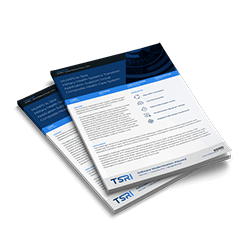Displaying items by tag: modernization
COBOL to C++ - Premera Blue Cross
Premera Blue Cross required the assessment, transformation and re-factoring of its existing Automated Document Assembly System (ADAS). ADAS was written in WANG COBOL and self generated WANG COBOL programs tailoring health care booklets for specific customer needs. TSRI was selected to assess, transform, and re-factor the WANG COBOL code, migrating the system into a C++ Windows NT environment with full functional equivalency.
 |
Customer: Premera Blue Cross Source & Target Language: COBOL to C++ Lines of Code: Nearly 50,000 Duration: 4 Months Services: Code Transformation, Automated Refactoring, Testing and Implementation Support, Transformation Blueprint®
|
Fortran to C++ - Raytheon Patriot Missile System
Raytheon has partnered with TSRI on several successful modernization projects. Specifically, several years before the Patriot-Japan project was initiated, Raytheon was tasked with modernizing a set of Patriot Missile Simulation software. Following a formalized decision process, TSRI was selected as the best option for transforming the code from FORTRAN to C++, due to our unique fully automated transformation technology. So, when Raytheon began modernizing Battalion Simulation Support System and its Preprocessor for the Japanese Patriot Missile system, TSRI was contacted and began work.
 |
|
BASIC to PL/SQL - Capita Prism
Capita, a company based in England and Wales, determined that one of their important software assets called PRISM required modernization, including code transformation, platform migration, and database migration. Capita engaged TSRI, with their proven automated modernization services, to complete this project, which was finished in 3 months.
 |
Customer: Capita Source & Target Language: BASIC to PL/SQL Lines of Code: 660,000 Duration: 3 months Services: Transformation Blueprint®, Automated Code Transformation, Automated Refactoring, Integration and Testing Support
|
JOVIAL J73 to C++ - BAE Systems
BAE Systems received an award from South Korea's Defense Acquisition and Procurement Agency for a multi-year project to upgrade 134 Korean Air Force F-16 (KF16) fighters. The upgrade included obsolescence management for the computers and operating systems for near real-time tactical data and voice information and including the Core operational flight programs: Advanced Mission Computer (AMC), Upgraded Central Interface Unit (UCIU), Cockpit Display Generator (CDG) and the Center Pedestal Display (CDP). BAE Systems employed TSRI for their modernization services to modernize and document the Jovial source code to C++.
 |
Customer: Bae Systems Source & Target Language: Jovial J73 to C++ Lines of Code: 340,000 Duration: 6 months Services: Code Transformation, Automated Refactoring, Installation and Testing Support, Transformation Blueprint®, Application Blueprint®
|
Ada to Java - Adv. Field Artillery Tactical Data System / Stanley
Stanley and Assoc. contracted TSRI to modernize the Battle Command Software - Advanced Field Artillery Tactical Data System (AFATDS). This system is an integrated system that provides the Army, Navy, and Marine Corps automated fire support command, control and communications. Prior to this modernization, AFATDS was written in legacy Ada-83. The target code selected for the AFATDS modernization was Java.
 |
|
Micro Focus COBOL to C & C++ - Sprint Billing
When Sprint Nextel Corporation (now T-Mobile) was ready to begin a modernization and cloud migration project for their billing system, they naturally turned to Amdocs, who then selected TSRI to complete the modernization of the billing system successfully. The billing system that Sprint wanted to modernize was written in over 5 million lines of Micro Focus rehosted Pro*COBOL and Pro*C code. Operational costs to maintain the system were consuming critical budget and hampering the organization’s capacity to enhance and scale the system to meet growing operational requirements.
 |
|
Ada to Java & C++ - Thales EATMS
The Eurocat Air Traffic Management System (EATMS) is used in 16 European countries and Australia. EATMS became subject to a modernization initiative in 2005. Thales Air Systems selected The Software Revolution, Inc. (TSRI) to modernize this system written in legacy Ada 83. After transforming this application to both Java and C++ for performance testing, Thales selected Java as the final target language and TSRI completed the modernization.
 |
|
Ada to C# - Canadian Forces Crypto System
General Dynamics awarded a sole-source contract to The Software Revolution, Inc. (TSRI) for the modernization of the Canadian Armed Force’s Crypto Material Management System (CMMS).
 |
Customer & Integrator: General Dynamics & Canadian Armed Forces Source & Target Language: Ada to C# Lines of Code: 20,000 Duration: 4 months Services: Legacy “As-Is” Documentation, Code Transformation, System Integration & Test Support, Final “To-Be” Documentation
|
Ada to C++ - Lockheed Martin / P-3C Orion
Lockheed Martin Corporation was tasked with the modernization of the Acoustic Signal Processor System (ASP) on the Navy's P-3C Orion aircraft. Lockheed Martin awarded TSRI a sole source contract as the only viable provider of 100% automated Ada to C++ transformation.
 |
|
COBOL to C++ - NEA / Administrative Systems
The National Endowments for the Arts (NEA) Grants Management System (GMS), Financial Management System (FMIS), and Automated Panel Bank System (APBS) were unique one-of-a-kind 27-year old legacy systems written in Wang VS COBOL, running on a WANG VS Operating System, and using a WANG VS DMS database. TSRI was engaged to transform these systems into C++ and completed the project successfully in 7 months.
 |
Customer: National Endowments for the Arts Source & Target Language: COBOL to C++ Lines of Code: 656,000 Duration: 5 months Services: Code Transformation, Automated Refactoring, System Integration Support, Testing Support, Transformation Blueprint ®
|
- cobol
- C++
- National Endowments of the Arts
- Code Transformation
- Automatic Refactoring
- transformation blueprint
- COBOL to C++
- Generated COBOL
- Financial System
- Software Modernization
- Software Code Transformation
- Legacy System
- modernization
- migration
- DMS Database
- sql
- Microsoft SQL Server
- isam
- Legacy Architecture
- SQL Server
- MS SQL

